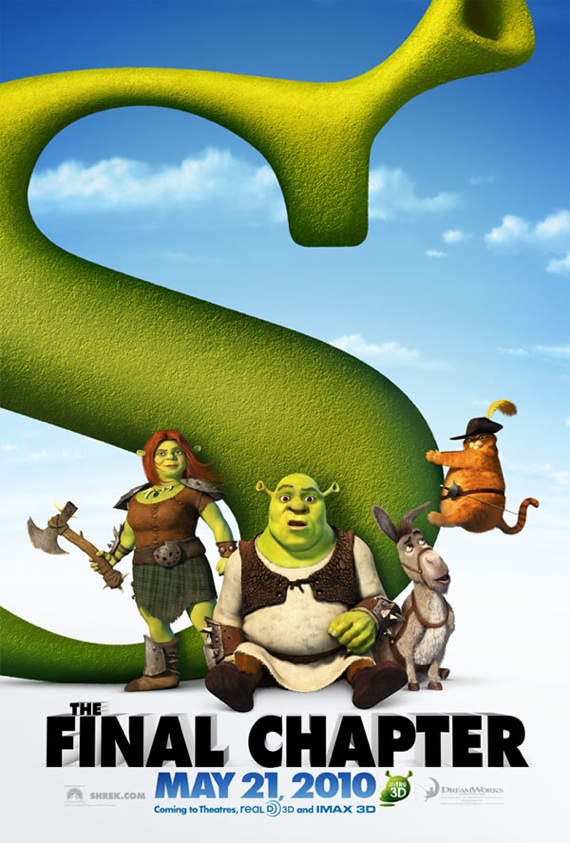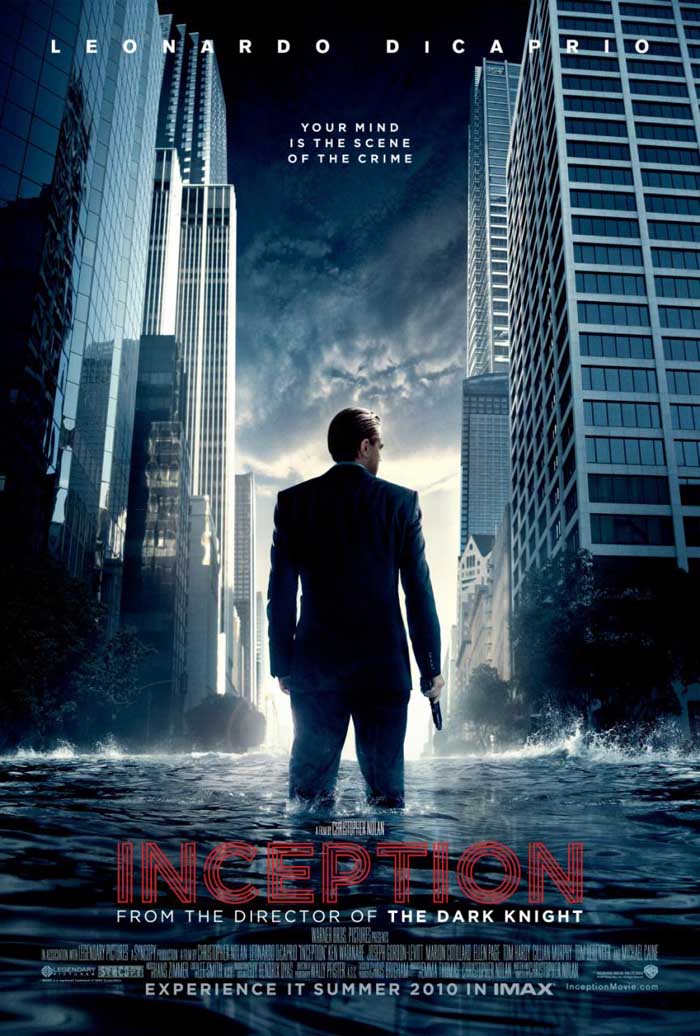2012 was an extremely good year for film, especially mainstream film, which is an improvement I've been dreaming of for quite a while. Though 2012 yielded only a small handful of absolute masterpieces, the sheer number of extremely high quality films this year blew me away. So, in recognition of this, I'm trying something new with my annual Top 10 list... I'm including 10 extra films that I feel would be criminal not to mention. This was a year where I felt there were 20 films that would ordinarily be Top 10 material, and I figure if the Academy can change the number of films it nominates from year to year, why can't I? I've ranked the official Top 10 like I always do, and beneath I've also listed 10 others in alphabetical order that I highly recommend. So, without further ado, take a look at the list, and please give me your feedback. I want to hear your opinions, thoughts, comments, and gripes!
1. Cloud Atlas
A sprawling, visionary, nearly flawless epic,
Cloud Atlas, though totally overlooked by all the major award shows (possibly for political reasons), was my clear-cut choice for Film of the Year. This film was so ambitious in scope that it required three directors working as a team to shoot it (Andy and Lana Wachowski along with Tom Tykwer). It takes place over several hundred years and is about human decisions rippling through time, ultimately resulting in a revolution aimed at ending class oppression. Several actors play multiples roles and the film utilizes reincarnation as a symbolic device to advance the complex narrative, based on the novel by David Mitchell. It's a nearly unclassifiable film as it incorporates elements of drama, comedy, action, sci-fi, and mystery, all combining to create an incredible epic about the human struggle between the oppressors and the oppressed, the rich and the poor, the strong and the weak, the master and slave, and the revolutionary spirit it takes for to overcome injustice. Perhaps the only flaw the film has is the casting of Tom Hanks, who is the only actor in the film unable to seamlessly disappear into his various roles. On the other hand, Hanks' involvement was a major factor in getting the film made in the first place, so it all comes out in the wash because the most important thing is that people seek out this film and become exposed to what it has to say about human life.
2. The Master

The Master, indeed. Paul Thomas Anderson has once again proven that he deserves to be named among the very best directors working today. In his latest masterpiece, Anderson tells the story of a troubled war veteran who returns home directionless and prone to violent outbursts. Joaquin Phoenix turns in the best acting performance of the year, fully immersing himself into the lead role and exuding a palpable sense of danger, like he could snap at any moment. He drifts aimlessly, often getting himself into trouble, until he crosses paths with a charismatic cult leader who takes him under his wing and teaches him The Cause, a fictional version of Scientology. Ultimately, it's a film about human behavior and relationships. Phoenix's Freddie Quill is broken, violent, frightening, socially awkward, and obsessed with sex, even though he might be a virgin (the film is vague on this point), and the audience experiences his attempt to become a less volatile person. It's impossible for me to fully explore the depths and implications of the interpersonal relationships explored in the film in this short space, but it has a lot to say about friendship, love, jealousy, and the human need for personal connection, both physical and emotional.
3. Django Unchained

I didn't think it was possible, but Quentin Tarantino has finally made a film exactly like I've always wanted him to make, reaching the height of his potential in the process. Here he's managed to set aside those "Tarantinoesque" gimmicks he's always relied so heavily on, and made a mature, intelligent film about a serious subject. Yet, amazingly,
Django Unchained is undeniably recognizable as a Tarantino film, incorporating all his best talents as a film maker while discarding everything that normally make his films impossible to take seriously. Slavery is as serious a subject as can be explored, and Tarantino, as only he can, has crafted a film that exposes the brutal horror of slavery, while simultaneously providing a cathartic antidote to the institution. In reality, reconstruction was never fully completed after the Civil War, but Tarantino shows us what should have been done: the righteous obliteration of the culture that sustained slavery. The only thing that could have improved this film is an expanded role for Kerry Washington.
4. The Perks of Being a Wallflower

The tagline for Sofia Coppola's
Lost in Translation was "Everyone wants to be found," and it could have just as well been applied here.
Perks is a coming-of-age film, following the path of an outcast high school freshman who is, to his surprise, accepted into a social circle of upperclassmen. Though slightly temporally ambiguous, it perfectly captures a certain era somewhere between the mid-'80s and mid-'90s when making a mix-tape (on an actual cassette) could perfectly represent how you felt about someone. It has an excellent script that deals with many heavy issues that kids sometimes unfortunately have to face on the path to adulthood, and it paints a portrait of friends as an alternative extended family that can be more important than actual family. To me anyway, the film is about how a group of friends who are truly committed to each other as human beings can literally save your life. There's strength in unity, and in a beautiful way
Perks provides an example of how the practice of acceptance and togetherness can be used as weapons to collectively survive in this society. Oh, and it's got a great soundtrack, too.
5. Beasts of the Southern Wild
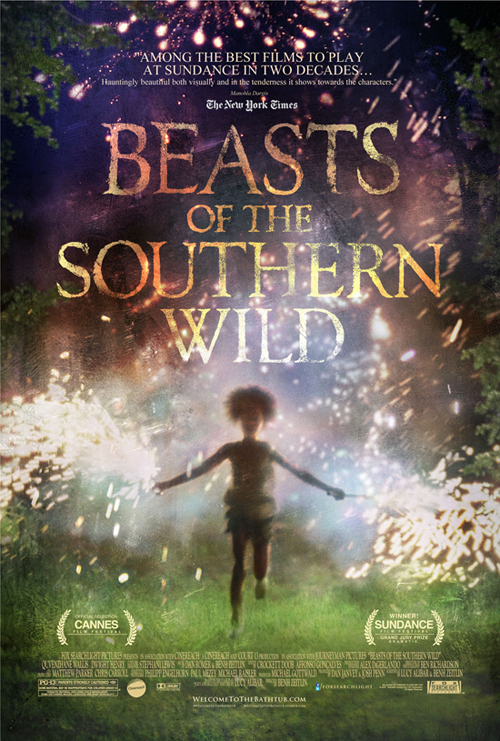
The big story here is the arrival of the child actress Quvenzhane Wallis who was only 6 years old during production. And what a force of nature she is! I can't think of any child actor since Shirley Temple who has completely carried a film at such a young age.
Beasts is the story of a small, poor commune of sorts cut off from the rest of the world on the other side of a levee, and that's the way they want it. The film opens with a holiday celebration and we discover a world of people better connected with the Earth and with each other. When a major flood comes, they survive together, but when Hushpuppy's (Wallis) father becomes ill she has to grow up and learn to fend for herself. What's great about this film is that it shows that children are people, too, and they can often understand and do much more than they are given credit for. The film also creates a stark contrast between our "civilized" way of life, and the lifestyle of the people of the "Bathtub." Though the people of the Bathtub are poor and their society dirty, it's also authentic and bound by a spirit of community.
Beasts shows us what's really important and how to really celebrate life, as it rejects almost everything that we take for granted.
6. Looper
One of the freshest and most innovative sci-fi films in recent memory,
Looper is a rare gem. Sci-fi has always been a genre that can hold a mirror up to society, and
Looper is no exception. Set in the not too distant future where time-travel has been discovered and is used illegally by the mob to dispose of its enemies cleanly, "Loopers" are specialized assassins who wait for their targets to be sent from the future to be executed on sight. While some elements of the way time-travel is explained in the film are slightly problematic, to dwell on that is to miss the larger point on the film. In the end, it's about being willing to sacrifice your own future to make the world a better place overall, and that's a lesson we need to hear loud and clear right now.
7. A Royal Affair
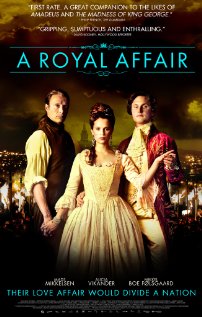
When British princess Caroline is sent to Denmark to marry King Christian VII, she had no idea what she was getting into. Christian suffered from a mental illness which wasn't understood at the time, and which allowed his actions to be manipulated by those around him, some of whom had good intentions, and others sought only greater power and influence. It also made marriage extremely difficult. Johan Struensee was a physician hired to assist the king, and eventually he and Caroline begin an affair. As a student of the Enlightenment Struensee was able to gain the king's trust and steer him into making many progressive reforms that benefited the people of Denmark. The film itself is beautifully shot and acted extremely well, and it highlights the struggle for progressive reform against a wealthy ruling class, and also illuminates constructive methods to deal with metal illness.
8. Seven Psychopaths
 Seven Psychopath
Seven Psychopaths is a wild, brilliantly written film, and is a great example of a film about its own creative process, similar in form to
Adaptation. For a film about murderous psychopaths, it's surprisingly complex and nuanced, and centers around a man struggling to write a screenplay about psychopaths simply because he finds the subject interesting, even though he's repulsed by violence. Not knowing where to take the narrative of his script, the film itself delves into the creative process, and the lines between reality and fiction begin to blur as the story is pieced together. The film represents a subversion of the action/thriller genre, and provides an insightful commentary on the prevalence of violence in American culture.
9. Killing Them Softly
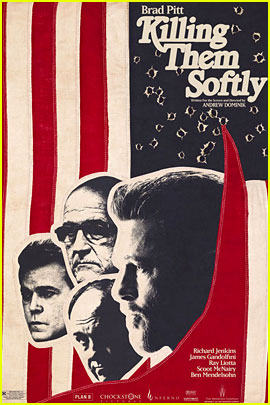
Andrew Dominick has created the perfect political allegory for today. Set during election season in '08 when the financial crisis was in full swing,
Killing Them Softly is a microcosm, centered around the economy of a local mob. After a mob run poker game is held up resulting in a "recession" in which the "confidence" of the mob is shaken, a "stimulus" of sorts is needed to return life to "normal." A hit-man is dispatched to track down and murder those responsible for the theft, allowing the mob to begin sponsoring card games again. The story unfolds against the backdrop of inner-city poverty and the decay of America from within, and speeches from president Bush and candidate Obama are injected into the narrative to hammer home the metaphor. The film is very simple and direct, but extremely bold in its direct association between capitalism and murder.
10. Being Flynn

An excellent film about writing and writers,
Being Flynn is a story about a father who thinks he's a great writer, but isn't, and his son, who actually is very talented but doesn't allow anyone to read his work because of a tragedy in his past. Robert De Niro turns in an excellent late-career performance as the elder Flynn, and Paul Dano turns in another quality performance as the younger. The film exposes the severe class divisions in America, as De Niro's character slips through the cracks into homelessness and ends up seeking refuge in the shelter where his son works. The film has many authentic scenes of how homeless shelters operate and the conditions the homeless live in on the streets. All the original music for the film was composed by Badly Drawn Boy which helps to establish the melancholy atmosphere in which the narrative operates. Overall, it's an excellent film that very few people saw, unfortunately, and I strongly encourage people to seek it out.
- Deadfall
A stylistic crime thriller that could easily be considered a Western if it weren't set against a backdrop of snow in Michigan. Great film about family dynamics.
- The Deep Blue Sea
A very deliberate, minimalist film set in London following WW2 about a woman who leaves her husband for another man, but ends up finding herself in the process. It's an empowering and moving film, driven by the amazing performance of Rachel Weisz.
- Flight
A surprisingly good film about an alcoholic pilot who successfully lands a damaged passenger plane and is dubbed a hero by the media, and his attempt to cover up the fact that he was drunk during the flight. A powerful film about addiction that very easily could have been named among my top 10.
- The Grey
After surviving a plane crash a group of men attempt to survive another danger, a pack of wolves who consider them invaders in their territory. It's a bleak tale of man against the elements, but with surprising depth and complexity.
- The Hobbit: An Unexpected Journey
The first part in Peter Jackson's second adventure into Middle Earth,
The Hobbit is a worthy companion to
The Lord of the Rings series. Though the jury is still out on the use of 48fps, the film itself was very well paced and provides valuable back-story to the Middle Earth saga.
- Holy Motors
Perhaps the most bizarre film I saw this year,
Holy Motors is the story of a sort of freelance actor who travels from job to job by limo and changes into character on the ride. When he emerges, he fully embodies his role, and we experience one full day of his work.
- The Hunger Games
One of the most politically important films of the year, along with
Cloud Atlas,
Django Unchained, and
A Royal Affair. Set in a dystopian North America after a fascist takeover, children are forced to fight to the death in a tournament designed to intimidate and pacify the masses, but our hero Katniss attempts to resist.
- Lawless
Three brothers in the moonshine business during prohibition are forced to fight both corrupt police and a powerful organized crime syndicate after refusing to pay a bribe. A great film about the hypocrisy of the law and law enforcement.
- Life of Pi
A stunningly beautiful film that makes excellent use of 3D technology and takes us on a journey of survival after a shipwreck leaves a teenager stranded on a lifeboat alone with a tiger. A great story that examines the importance of storytelling and art as an indispensable aspect of life.
- Silver Linings Playbook
Another film that examines mental health, it's the story of a man with bi-polar disorder moving back in with his parents in an attempt to put his life back together. He wants to reconcile with his wife, but he meets another girl and they decide to enter a dancing competition.
Worst Film of the Year (out of the 42 I've seen)
-
21 Jump Street










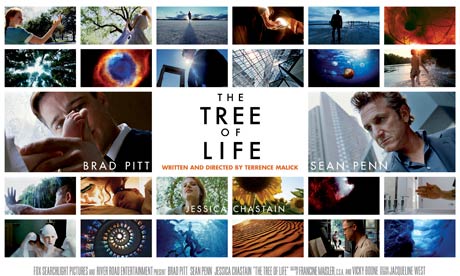








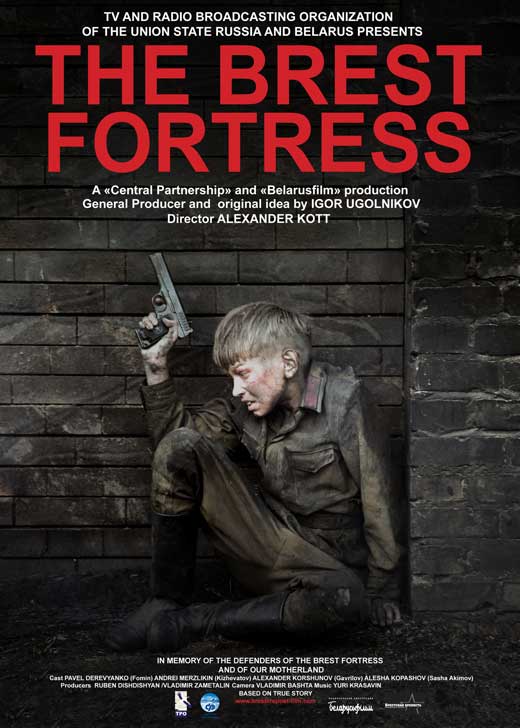










 There was a time, not all that long ago, when people would venture out to the video store, browse the shelves, read the plot summaries on the back of the boxes, and select a movie or two to take home for the next few days. It was a family affair, parents often taking their kids out to find something to watch together in the living room. But times have changed. It’s an “on-demand” age now.
There was a time, not all that long ago, when people would venture out to the video store, browse the shelves, read the plot summaries on the back of the boxes, and select a movie or two to take home for the next few days. It was a family affair, parents often taking their kids out to find something to watch together in the living room. But times have changed. It’s an “on-demand” age now.



